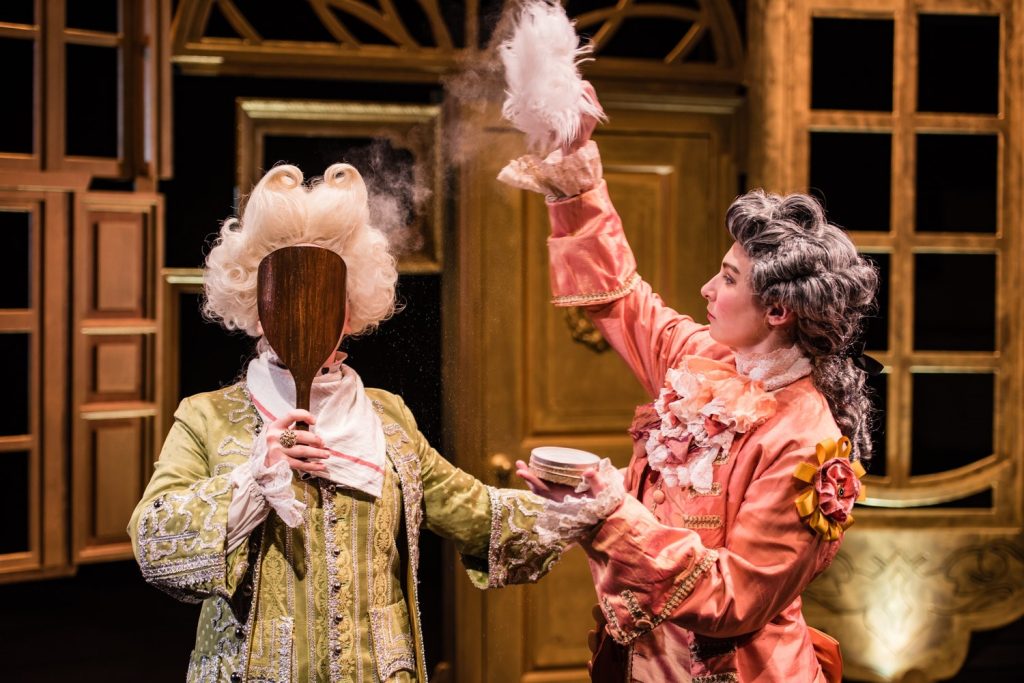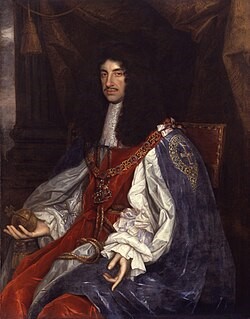First Lady of Scandal & Stage

Andrew Meets Aphra Behn It’s 1687, two years before her death, and Aphra Behn is at the height of her powers. Her play The Lucky Chance has just premiered at the Theatre Royal, a scandalous success that’s made the censors fume and the audience roar. She’s controversial, unapologetic, and writing faster than most men can think. I want to catch her at this peak—when the ink is fresh, the wit sharper than ever, and her fame both secure and volatile. This is the moment to meet her.
Aphra Behn is the first English woman to earn her living by writing. A royalist spy under the codename “Astrea,” a playwright known for clever heroines and biting satire.
And a novelist whose pen ranges from political intrigue to proto-abolitionist prose, she has carved a place in literary history with nerve and craft. In a world that bars women from public life, she didn’t just enter it—she has made it her stage.
Do you remember your childhood clearly—or did you choose to obscure it?
“I remember enough to know that it offered no significant advantage. But clarity is not always a blessing. A murky past invites curiosity—and when people are curious, they ask the wrong questions and miss the true ones.
I found it helpful to be a little blurred at the edges. It gave me room to invent myself, and invention has always served me better than fact.”
Is it true that you once acted as a spy?
“Not only true—I lived it, breathed it, nearly died from it. Antwerp, 1666. I was sent to observe Dutch movements during the war, to charm, extract, and deliver information under the name ‘Astrea.’
I played cards with men who could have had me executed, passed notes in invisible ink, and slept in inns where every creak of a floorboard meant danger.
I was always one step from disgrace or death. When the crown left me unpaid, I came back not defeated—but full of stories too volatile for silence. That life made me a writer.”
Who was Aphra Behn before she became ‘Astrea’?
“A girl with a sharp ear, a sharper eye, and no intention of being ordinary. I learned to read people the way others read books. I saw how men wielded power with charm and cruelty and how women survive by pretending not to notice. Astrea wasn’t a disguise—it was a door. Once I walked through it, I knew I’d never return to the life expected of me.”
Did you ever regret becoming a spy?
“Regret is a luxury for people who are kept safe. I regret the lack of payment and the betrayal by those I served—but not the work itself. I learned more about duplicity, desperation, and the masks people wear than I ever could in a parlour. It wasn’t espionage that disappointed me. It was the kingdom I served.”
How did poverty shape your ambition?
“Poverty is a fierce editor—it cuts all illusions. I couldn’t afford the leisure of reputation or the comfort of waiting.
When hunger presses, it becomes a kind of tutor. It teaches you to be bold, take risks, and trade safety for possibility. Without poverty, I might have been cautious. With it, I had no choice but to become relentless.”
Did you find more freedom in the theatre or the political world?
“Theatre gave me control. I was a servant in politics, useful, disposable, and often ignored. But on stage, I was sovereign. I chose the words, shaped the characters, and determined their fates. The audience may have laughed or scowled, but the ink was mine. No courtier ever held such power.”
When did you first realise your pen could earn you a living?
“The moment that laughter erupted where I had aimed it. It felt like a coin dropped in my hand. That was when I knew that it could feed me. Not endlessly and not without risk, but enough to buy space, time, and a sliver of independence. That first play gave me something I’d never Aphra Behn is the first English woman to earn her living by writing. A royalist spy under the codename “Astrea,” a playwright known for clever heroines and biting satire.
And a novelist whose pen ranges from political intrigue to proto-abolitionist prose, she has carved a place in literary history with nerve and craft. In a world that bars women from public life, she didn’t just enter it—she has made it her stage.
Do you remember your childhood clearly—or did you choose to obscure it?
“I remember enough to know that it offered no significant advantage. But clarity is not always a blessing. A murky past invites curiosity—and when people are curious, they ask the wrong questions and miss the true ones.
I found it helpful to be a little blurred at the edges. It gave me room to invent myself, and invention has always served me better than fact.”
Is it true that you once acted as a spy?
“Not only true—I lived it, breathed it, nearly died from it. Antwerp, 1666. I was sent to observe Dutch movements during the war, to charm, extract, and deliver information under the name ‘Astrea.’
I played cards with men who could have had me executed, passed notes in invisible ink, and slept in inns where every creak of a floorboard meant danger.
I was always one step from disgrace or death. When the crown left me unpaid, I came back not defeated—but full of stories too volatile for silence. That life made me a writer.”
Who was Aphra Behn before she became ‘Astrea’?
“A girl with a sharp ear, a sharper eye, and no intention of being ordinary. I learned to read people the way others read books. I saw how men wielded power with charm and cruelty and how women survive by pretending not to notice. Astrea wasn’t a disguise—it was a door. Once I walked through it, I knew I’d never return to the life expected of me.”
Did you ever regret becoming a spy?
“Regret is a luxury for people who are kept safe. I regret the lack of payment and the betrayal by those I served—but not the work itself. I learned more about duplicity, desperation, and the masks people wear than I ever could in a parlour. It wasn’t espionage that disappointed me. It was the kingdom I served.”
How did poverty shape your ambition?
“Poverty is a fierce editor—it cuts all illusions. I couldn’t afford the leisure of reputation or the comfort of waiting.
When hunger presses, it becomes a kind of tutor. It teaches you to be bold, take risks, and trade safety for possibility. Without poverty, I might have been cautious. With it, I had no choice but to become relentless.”
Did you find more freedom in the theatre or the political world?
“Theatre gave me control. I was a servant in politics, useful, disposable, and often ignored. But on stage, I was sovereign. I chose the words, shaped the characters, and determined their fates. The audience may have laughed or scowled, but the ink was mine. No courtier ever held such power.”
When did you first realise your pen could earn you a living?
“The moment that laughter erupted where I had aimed it. It felt like a coin dropped in my hand. That was when I knew that it could feed me. Not endlessly and not without risk, but enough to buy space, time, and a sliver of independence. That first play gave me something I’d neverAphra Behn is the first English woman to earn her living by writing. A royalist spy under the codename “Astrea,” a playwright known for clever heroines and biting satire.
And a novelist whose pen ranges from political intrigue to proto-abolitionist prose, she has carved a place in literary history with nerve and craft. In a world that bars women from public life, she didn’t just enter it—she has made it her stage.
Do you remember your childhood clearly—or did you choose to obscure it?
“I remember enough to know that it offered no significant advantage. But clarity is not always a blessing. A murky past invites curiosity—and when people are curious, they ask the wrong questions and miss the true ones.
I found it helpful to be a little blurred at the edges. It gave me room to invent myself, and invention has always served me better than fact.”
Is it true that you once acted as a spy?
“Not only true—I lived it, breathed it, nearly died from it. Antwerp, 1666. I was sent to observe Dutch movements during the war, to charm, extract, and deliver information under the name ‘Astrea.’
I played cards with men who could have had me executed, passed notes in invisible ink, and slept in inns where every creak of a floorboard meant danger.
I was always one step from disgrace or death. When the crown left me unpaid, I came back not defeated—but full of stories too volatile for silence. That life made me a writer.”
Who was Aphra Behn before she became ‘Astrea’?
“A girl with a sharp ear, a sharper eye, and no intention of being ordinary. I learned to read people the way others read books. I saw how men wielded power with charm and cruelty and how women survive by pretending not to notice. Astrea wasn’t a disguise—it was a door. Once I walked through it, I knew I’d never return to the life expected of me.”
Did you ever regret becoming a spy?
“Regret is a luxury for people who are kept safe. I regret the lack of payment and the betrayal by those I served—but not the work itself. I learned more about duplicity, desperation, and the masks people wear than I ever could in a parlour. It wasn’t espionage that disappointed me. It was the kingdom I served.”
How did poverty shape your ambition?
“Poverty is a fierce editor—it cuts all illusions. I couldn’t afford the leisure of reputation or the comfort of waiting.
When hunger presses, it becomes a kind of tutor. It teaches you to be bold, take risks, and trade safety for possibility. Without poverty, I might have been cautious. With it, I had no choice but to become relentless.”
Did you find more freedom in the theatre or the political world?
“Theatre gave me control. I was a servant in politics, useful, disposable, and often ignored. But on stage, I was sovereign. I chose the words, shaped the characters, and determined their fates. The audience may have laughed or scowled, but the ink was mine. No courtier ever held such power.”
When did you first realise your pen could earn you a living?
“The moment that laughter erupted where I had aimed it. It felt like a coin dropped in my hand. That was when I knew that it could feed me. Not endlessly and not without risk, but enough to buy space, time, and a sliver of independence. That first play gave me something I’d never

Which of your plays do you think was most misunderstood?
“The Feigned Courtesans” was treated like a scandal sheet, but it was a manifesto in silk. Beneath the laughter and disguises, I was writing about the terrifying freedom of choosing your own path. Men called it lewd; women saw the mirror. I don’t mind being misunderstood by those who came to judge—I wrote for those who came to see.”
How did you balance wit with danger in your writing?
“I learned to lace the poison with honey. A line spoken in jest could stab twice as deep as one meant in fury. I amused them into thinking they were safe, then slipped in the truth like a stiletto. Wit isn’t just decoration—it’s camouflage. It lets you speak what’s forbidden.”
Did the bawdiness in your plays serve as rebellion—or truth?
“Both, naturally. Truth often wears bawdy clothes to make it past the gatekeepers. What better way to expose hypocrisy than through laughter? If I shocked them, it was because the truth was shocking. I never wrote filth—I wrote mirrors, and some people don’t like their reflection.”
How did you navigate being a woman in a man’s world of theatre and espionage?
“I stopped asking. I made my own space, loud and clever and undeniable. They tried to laugh me off the stage, but I laughed louder. If I’d waited for permission, I’d be sewing cuffs in some back room. Instead, I wrote men into corners—and made them applaud.”
Did you believe women were naturally freer in love than in society?
“Yes, because love—when chosen—is an escape hatch. Society lays out rules like chains, but love can be an act of rebellion. Not always, of course—it can trap just as easily. But when a woman claims her desire on her own terms, even briefly, she touches something like freedom.”
What compelled you to write Oroonoko?
“Because I had seen too much. I saw nobility destroyed, humanity denied, and cruelty dressed in policy. Oroonoko was more than a man, he was a symbol of what empire crushes. I couldn’t save him, but I could give him words. And perhaps shame a few hearts into waking.
How much of that story is your truth—and how much is your invention?
“All of it is true, and all of it is fiction. That’s the paradox of storytelling. I embroidered, yes—but the core is real. I carried his eyes with me for years. He was not a fable. He was a reckoning.”
Do you think your readers saw Oroonoko as political or romantic?
“The best ones saw both. The others sighed over the love story and ignored the chains. I wrote it so the tenderness and the terror could not be separated. You can’t feel one without facing the other.”

Do you think your readers saw Oroonoko as political or romantic?
“The best ones saw both. The others sighed over the love story and ignored the chains. I wrote it so the tenderness and the terror could not be separated. You can’t feel one without facing the other.”
Did Charles II value your service—or only your silence?
“He liked my cleverness until it was inconvenient. Charles was a man of appetites, he rewarded beauty, not loyalty. I was useful in war and entertaining in peace. But when I needed him most, he vanished behind his throne. That taught me to make kings into characters instead of masters.”
What would you say to today’s women writers still fighting for space?
“Don’t knock. Don’t ask. Build your own door and walk through it like you own the place. Take up space until the walls tremble. And remember, every time you write with honesty and nerve, you make more space for someone else.”
Would you choose fame or freedom if you could only have one?
“Freedom, always. Fame is a bauble. Freedom is breath. You can’t eat reputation. You can’t sleep inside applause. Give me ink, time, and the right to speak without permission—and I will write myself into immortality.”
Are you still watching what we do with your words?
“Every syllable. Every silence. I listen when you whisper what you’re afraid to say. And I cheer when you say it anyway.”
Aphra rises, smiles briefly without a “goodbye”, all fire and velvet, and vanishes into the dark corridor beyond the stage.
PERSPECTIVE

Aphra Behn wasn’t merely England’s first professional woman writer—she was a literary insurgent. Her voice rewrote the rules. She tackled the empire before it was fashionable, made women central when they were meant to be silent, and turned it into a political weapon. While men dismissed her as scandalous, she forged the blueprint for future writers who refused to bow.
Today, her influence isn’t confined to anthologies or dusty footnotes—it lives in every writer who uses boldness, bawdiness, and brilliance to carve space in a still uneven world. Her tombstone reads: “Here lies Proof that Wit can never be Defence enough against Mortality.” Perhaps not. But wit like hers? It still leaves scorch marks.
© ANDREW LEIGH 2025
This intriguing book is hard to put down and makes a memorable gift for someone you care about.